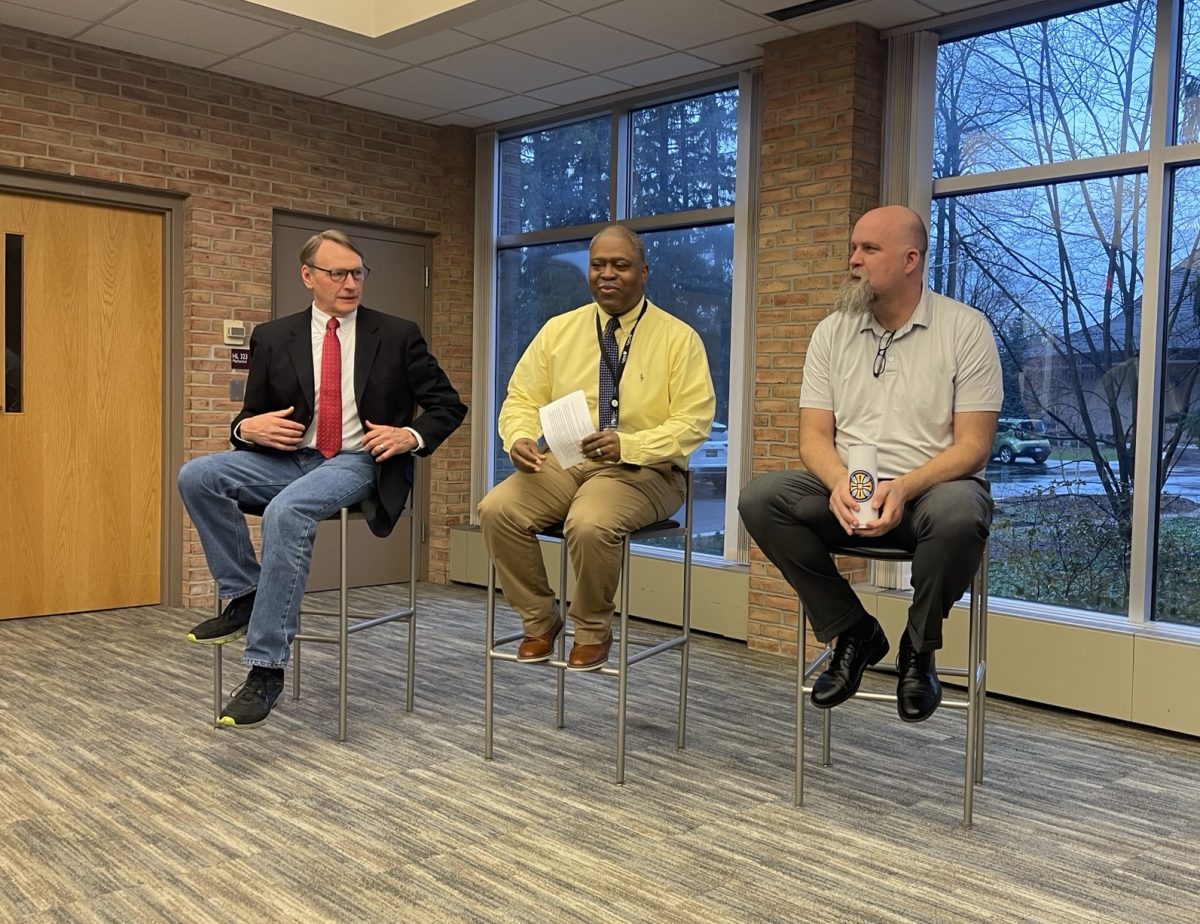Last Thursday, March 14, Calvin’s Political Dialogue and Action (PDAC) student organization hosted a panel discussion about presidential accountability, the rule of law and the various criminal and civil charges against former President Donald Trump. Professors Eric Washington, Micah Watson, and Doug Koopman all spoke. For those who didn’t attend, Chimes held a Q&A with professors Washington and Koopman after the event.
This interview has been edited for length and clarity.
[Trump] is singular in the fact that there’s never been a candidate quite like Trump.
Chimes: Professor Washington, you talked a lot about Donald Trump as both singular and as part of a broader pattern. Could you summarize both of those sides of Trump?
Washington: Yeah. [Trump] is singular in the fact that there’s never been a candidate quite like Trump. No political experience. Came from the business world. He has a checkered past in that. [He was a] Reality star, thrice-married, had an affair, married the woman that he had an affair with, so forth and so on. All of this. Those things are singular in my perspective, in terms of a candidate. Ronald Reagan, Nancy Reagan — I think both of them are in second marriages. But it wasn’t anything like Donald Trump coming to the political arena.
And him being a former owner of a USFL [United States Football League] team. I can’t say that’s so singular because George [W.] Bush was the principal owner of the Texas Rangers. But still, Trump being this huge figure in the entertainment world as well as in the business world makes him singular.
What makes him not so singular is the rhetoric that he espouses. Especially the racism that he espouses — that he espouses now and espouses then. I mentioned birtherism, and he’s still using that.
He used it recently with Nikki Haley. He has articulated aloud what many people, especially since the Obama presidency, during the Obama presidency, were being inarticulate or not saying publicly — especially the rhetoric about where the country is going. Obama being hung in effigy — basically a continuation of minstrel depictions of Obama — that’s old. So the rhetoric of Trump is not so nuanced in that sense. He didn’t make all this stuff up.
He had good handlers who said “You should use this, use that.” Again, I think — to Professor Koopman’s point earlier in the event — he tapped into a lot of fear.
Chimes: You both talked about Trump and his relationship to professional wrestling. What are some of the similarities there? And what do you think some of the effects on our political context are?
Washington: The reason why I’ve added this to my own presentation is I’m thinking about the showman, Trump the showman. And I remember that he and Vince McMahon faced off in the “Battle of the Billionaires.” I’ve seen the clip. And then I started reading more up on this, and I said, “oh, this is deeper than I thought.” He’s really appropriated that whole genre of entertainment.
As Professor Koopman stated in his presentation, there’s this script that professional wrestling abides by. It’s a clear line between the good guys and the bad guys. Sometimes the good guys switch to bad guys, and sometimes the bad guys switch to good guys. That happens, and that’s expected. The audience expects that. But we know that championships have already been decided.
So the whole thing is rigged. So he uses that type of language. He also uses the language of put-down and insults, insulting his opponents to minimize them. So I think there’s more than one similarity. There’s a growing body of scholarship that links Trumpian rhetoric to that of championship wrestling, especially WWE.
Koopman: I don’t have a whole lot to add to what Professor Washington said. But in professional wrestling, people are not only in character in the ring. All the time they’re in character. It’s hard to know what’s really real and what’s just in character. And when they’re in character, everything said and everything done really isn’t taken seriously. It’s a joke, right? And I think President Trump has used that often if he’s been caught being very offensive. He’ll say, “You don’t understand sarcasm, I was being sarcastic. I was telling a joke.”
So he’s trying to blur the line, too, and not really be held accountable for the words he says and the actions he takes. Very much like professional wrestling. They want to clearly muddy the line between what’s in character and what’s genuine.
Chimes: From both of you, what are some of your hopes and some of your fears as the election gets closer and these cases start to be decided?
Washington: In all transparency, I’m a Democrat. I’m not just a Democratic voter, but I am a card-carrying member of the Michigan Democratic Party. I hope he loses! Am I thrilled with Biden, who’ll be 82 years old on Inauguration Day? No, I’m not. I’m disappointed in the Democratic National Convention, and that it has held a lot of young, up-and-coming, talented politicians down.
I don’t know where the party’s going to go in terms of a post-Biden presidency, whether it ends with this election or it ends in five more years. I guess my fear would be a second Trump presidency that is far worse than the first one because he’s got the experience now. He can do a lot of damage, more so than he did from 2017 to 2021.
Koopman: My first hope is that some Calvin students who live in Michigan either run for public office and file by April 24, or at least become a precinct delegate in either the Democratic Party or the Republican Party and file [their candidacy], I think it’s by early May, and participate in the political parties so that they become more like they want them to be. So that’s my first hope, that you all get involved directly in one of the two major parties.
I don’t think his window of ability to do what he wants to do, where he wants to do it is very long. But I do think he could win.
Second is that a few of these court cases get decided and that the outcomes are accepted broadly by the public. I expect there’ll be some convictions in some places. And I think that voters will take those seriously. Because setting aside the prosecutorial discretion and some prosecutors’ desire to get Donald Trump, all the charges are serious enough charges. Many grand juries have looked at the evidence first and abroad and agreed that they’re serious charges.
So I just hope we take the legal system seriously. Because it is serious work. I’m less worried about a second Trump presidency. I think he’s a lame duck. If he wins, he’s a lame duck on Nov. 6, and so much of the Republican establishment will want to get rid of him and run away from him.
I don’t think his window of ability to do what he wants to do, where he wants to do it is very long. But I do think he could win.
— In an earlier version of this story, Chimes misquoted Dr. Eric Washington as referring to Nancy Pelosi, rather than Nancy Reagan. We regret the error and have corrected it.








Dennis • Mar 19, 2024 at 4:12 am
Correction to Eric Washington: Nancy Pelosi married her husband, Paul, in 1963, while still a college student. She is not in her second marriage.